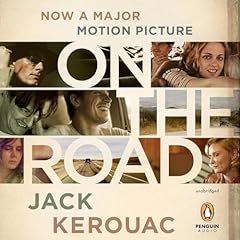
Breakfast at Tiffany's
No se pudo agregar al carrito
Add to Cart failed.
Error al Agregar a Lista de Deseos.
Error al eliminar de la lista de deseos.
Error al añadir a tu biblioteca
Error al seguir el podcast
Error al dejar de seguir el podcast
Obtén 3 meses por $0.99 al mes + $20 de crédito Audible
 Exclusivo para miembros Prime: ¿Nuevo en Audible? Obtén 2 audiolibros gratis con tu prueba.
Exclusivo para miembros Prime: ¿Nuevo en Audible? Obtén 2 audiolibros gratis con tu prueba.
Compra ahora por $9.95
-
Narrado por:
-
Michael C. Hall
-
De:
-
Truman Capote
Golden Globe-winning actor Michael C. Hall (Six Feet Under) performs Truman Capote's provocative, naturalistic masterstroke about a young writer's charmed fascination with his unorthodox neighbor, the "American geisha" Holly Golightly. Holly - a World War II-era society girl in her late teens - survives via socialization, attending parties and restaurants with men from the wealthy upper class who also provide her with money and expensive gifts. Over the course of the novella, the seemingly shallow Holly slowly opens up to the curious protagonist, who eventually gets tossed away as her deepening character emerges.
Breakfast at Tiffany's, Truman Capote's most beloved work of fiction, introduced an independent and complex character who challenged audiences, revived Audrey Hepburn's flagging career in the 1961 film version, and whose name and style has remained in the national idiom since publication. Hall uses his diligent attention to character to bring our unnamed narrator’s emotional vulnerability to the forefront of this American classic.
©1950, 1951, 1956, 1958, 1978, 1979, 1984 Truman Capote. Copyright renewed 1986 by Alan U. Schwartz (P)2014 Audible Inc.Los oyentes también disfrutaron:




















Reseñas editoriales
Editors Select, February 2014 - Although very familiar with the iconic film, I'd never actually read the novella Breakfast at Tiffany's by Truman Capote. When I heard that actor Michael C. Hall (Six Feet Under) was narrating it for Audible, I jumped at the chance to listen. Capote's classic is simultaneously darker and more wistful than the film, and the famed Holly Golightly a little more calculating than charming. Michael C. Hall delivers a mesmerizing performance, giving each character their own unique voice. Hall's cadence perfectly matches Capote's words, and he forced me into my own whirlwind friendship with Holly. I'd never before experienced a narrator who seemed to so completely understand an author's intentions – the effect was magical. —Katie, Audible Editor
Reseñas de la Crítica
"[Michael C. Hall] uses his diligent attention to character to bring our unnamed narrator's emotional vulnerability to the forefront of this American classic.... I felt content and comfortable in Hall's hands as the tale unfolded. He did a wonderful job giving each character voice, especially that of Holly." (Caffeinated Book Reviewer)
Featured Article: The Best Celebrity Narrated Audiobooks
It’s likely you have an actor who you can’t wait to see in a new movie or television series. Your favorite performer just might also be an acclaimed audiobook narrator. It’s always a delight to pick up a familiar story and find an unexpected famous friend in the narrator’s booth, especially when that celebrity has a spectacular talent for narration. Discover some of literature’s greatest stories brought to life by some of Hollywood’s greatest talents.
Las personas que vieron esto también vieron:


















Excellent narrator, a bit strange story
Se ha producido un error. Vuelve a intentarlo dentro de unos minutos.
Lovely
Se ha producido un error. Vuelve a intentarlo dentro de unos minutos.
Would you consider the audio edition of Breakfast at Tiffany's to be better than the print version?
I consider the audio edition of any book superior to the print version as I listen to books on-the-go.What was one of the most memorable moments of Breakfast at Tiffany's?
I loved the character development and wanted more. For me, that's the difference between a great read and a good read. You don't want it to end.Wish it Were Longer
Se ha producido un error. Vuelve a intentarlo dentro de unos minutos.
Great story, wonderfully read
Se ha producido un error. Vuelve a intentarlo dentro de unos minutos.
Would you recommend this audiobook to a friend? If so, why?
Yes, it's short and well read.Which character – as performed by Michael C. Hall – was your favorite?
I think I loved them all. Honestly, Michael C. Hall did a fantastic job switching between characters and gave each their own unique voices. At times I forgot I was listening to a single narrator and got lost in the story because of how smooth his transitions were.Any additional comments?
I have never seen the movie, but I definitely enjoyed this short listen. I was able to listen to it during an afternoon shift at work.Fantastic listen.
Se ha producido un error. Vuelve a intentarlo dentro de unos minutos.
Fantastic!
Se ha producido un error. Vuelve a intentarlo dentro de unos minutos.
If you could sum up Breakfast at Tiffany's in three words, what would they be?
Funny, engaging & entertaining.What did you like best about this story?
The way Holly Go Lightly character seem to come to life. That it was absolutely nothing like the movie.What about Michael C. Hall’s performance did you like?
YesIf you could rename Breakfast at Tiffany's, what would you call it?
I would not rename it.enjoyable
Se ha producido un error. Vuelve a intentarlo dentro de unos minutos.
Wonderful performance!
Se ha producido un error. Vuelve a intentarlo dentro de unos minutos.
If you enjoy what seems now stilted language....
Se ha producido un error. Vuelve a intentarlo dentro de unos minutos.
So much better than the movie
Se ha producido un error. Vuelve a intentarlo dentro de unos minutos.



